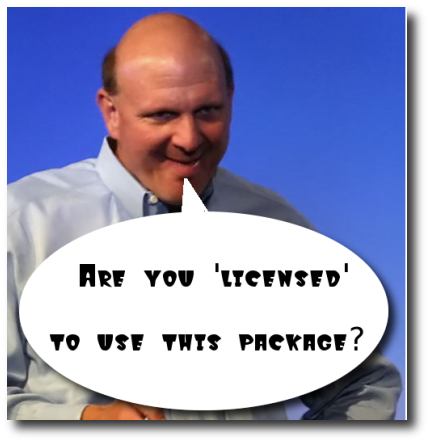12.23.11
Posted in Apple, GNU/Linux, Google, Patents at 4:47 pm by Dr. Roy Schestowitz
Back to the basket for the bullies from Cupertino

Summary: A roundup of news about Apple’s patent wars (against everyone) and a bit of good news, arriving just before Christmas
AS we return to covering the patent issue we regret to say that there is mostly bad news. Being aware of the news, however, is regretfully essential.
The subject we chose to tackle last is Apple. This company is fast becoming just as much of a nuisance as Microsoft has been. The Inquirer (British tech tabloid) has a nice way of covering Apple stories and it is filled with subtle humour that cushions the blow of horrible news. Recently it covered the news about Apple getting sued for caller ID patents. Previously, a caller ID app for Android was killed this way, demonstrating the terrible state of the patent system.
“Apple’s behaviour with patents is not just harming Linux or Android users; it is harming everyone and even Opera is complaining, noting that Apple patents undermine open standards.”Apple the patent bully might learn to dislike software patents if it gets sued by them quite a lot. So in a way the above news can be classified as good news.
Apple’s behaviour with patents is not just harming Linux or Android users; it is harming everyone and even Opera is complaining, noting that Apple patents undermine open standards. Mike Masnick put it like this and “going for leadership in evil” wrote Glyn Moody (via Jérémie Zimmermann).
Let us recall Apple’s support for MPEG-LA. Apple promotes video tax in yet more ways based on this new report which says:
Royalty-free web vid spec sets sail with Apple’s help
A proposed standard to stream video online smoothly, regardless of network conditions, has been pushed forward with some rather unexpected patent-holder help.
MPEG-DASH was approved in a vote by ISO national member bodies as a way to stream media over HTTP. Publication of the standard is expected “shortly”.
MPEG-DASH could supersede a raft of proprietary and royalty-protected technologies, developed by tech companies to stream media to mobile devices in particular – which are at the mercy of varying network speeds and connectivity conditions.
To Hell with Apple for helping those patent trolls. Another person who helps them is Microsoft Florian, who has pushed their agenda since last year. Florian no longer tries to endorse Microsoft in public because people already know that Microsoft pays him. That would further discredit this deceitful lobbyist.
“Florian no longer tries to endorse Microsoft in public because people already know that Microsoft pays him.”Looking at what Apple does to Linux/Android, here we have a report on “Apple’s first major legal win against Android,” which is “no slam dunk” because despite attempts to remove Linux devices from the shelves, Apple is not quite there yet. But to quote Reuters: “Patent firm IPCom said on Tuesday it had asked top German cellphone retailers to stop selling phones of HTC, threatening them with legal action, as HTC has not complied with a court ruling on injunction of its sales.”
FOSS-hostile patent lawyers write about Apple’s embargo attempts in the US and Murdoch’s fake news claims that HTC phones are “banned from store shelves” although it’s not quite true in practice. As the FFII’s president puts it:
Laughing loud on Apple’s patent “tap on a phone number or address contained in an email to immediately call the number”
Due to this kind of stupidity “Apple May Get To Remove Obvious Features From Android”. Here are some of the details:
Apple May Get To Remove Obvious Features From Android
[...]
Copying an idea and building on it is not “stealing.” And if Apple had to build its devices without building on the ideas of others, it wouldn’t have very much today. This whole thing is a joke, and it’s rulings like this that make engineers have even less respect for the patent system.
Apple brings is bullying to Britain now, i.e. it comes to new countries where software patents are in principle not permitted. Slashdot tells us that “Apple Transfers Patents Through Shell Company To Sue All Phone Makers 422″. We covered this some days ago, but here is the summary which has a huge discussion at the end:
“A patent lawsuit (PDF) by patent licensing firm Digitude Innovations curiously targeted all mobile manufacturers except Apple. A TechCrunch story has revealed that the patents used were transferred from Apple via a shell company to DI, and appear to cover features found in virtually all smartphones. The lawsuit even extends to companies that don’t make Android phones, like Nokia and RIM, and to Android OEMs that Apple have not directly sued yet, like Sony. The business model of DI clearly implies that Apple would benefit financially from the lawsuit as a company that contributed patents to DI’s portfolio.”
Slashdot shows another ridiculous patent from Apple and notes that:
“Apple has had quite a week in patents for the iPhone, and it’s only Tuesday. First was the victory at the International Trade Commission over HTC. And now there’s a shiny new patent on switching to an app during a live phone call (#8,082,523). There may be non-infringing ways of doing something similar, but they probably will be clumsy in comparison.”
Supporters of Apple’s ways should take a moment to objectively assess what Apple is doing here.
Here is how Muktware put it: “In a nutshell its about how you can switch between call and an app. Almost every touch-based phone uses this ‘process’ and potentially infringes upon this patent. It will be a challenge for Apple competitors to find other ways to do the same thing. Yet another example of the software/process patent mess that the flawed US patent system is creating.”
Google has been getting its own share of ridiculous patents, but it has no history of using patents offensively. This ought to invalidate concerns about Google getting more patents. Bloomberg says:
European Union regulators suspended their antitrust review of plans by Google Inc. (GOOG), the biggest maker of smartphone software, to buy Motorola Mobility Holdings Inc. after requesting more information about the deal.
The antitrust authority will continue the review after it has obtained “certain documents that are essential to its evaluation of the transaction,” said Amelia Torres, a spokeswoman for the Brussels-based European Commission. The commission temporarily stopped the review on Dec. 6, according to a filing on the regulator’s website today.
The patent angle need not be of concern because Google is not offensive with patents, contrary to claims from the Microsoft lobbyist (Florian). If anything, it can make Motorola more patents hostile and thus reduce altercations. According to this new article, patents are becoming more and more of an issue to Google because:
• Is the cloud the new front in the tech patent wars? A company headed by the founders of peer-to-peer networks Kazaa and Morpheus have reportedly banded together to sue Google, Amazon.com, VMWare and others, alleging patent infringement on cloud technology. The website of the plaintiff, PersonalWeb, says the company owns 13 “fundamental pending and issued patents,” and that it is “developing ground-breaking technologies and products,” including StudyPods, an online learning platform that’s in beta. But a patent-law specialist quoted in the Sydney Morning Herald points out that PersonalWeb filed the lawsuits in a Texas court that’s the “preferred venue for so-called patent trolls.” The eight patents in question include those related to “content addressable storage and/or distributed search engine technologies,” according to the SMH.
Going back to Apple, the company is trying to restrict designs based on ideas that it never came up with itself. To quote Slashdot:
“In a public legal brief (PDF), Apple offers numerous design alternatives that Samsung could have used for its smartphones and tablets to avoid infringing on Apple’s patents. Basically, as long as competitors’ smartphones and tablets bear no resemblance to smartphones and tablets, everything’s cool.”
To finish this with some good news (for a change), Apple lost a case in Germany and that rectangle with buttons on it will therefore be legitimate for sale, even without an apple-shaped logo:
Apple Lost Germany, Court May Allow Samsung To Sell Galaxy Tab
After Australia Apple has lost another ‘patent’ post, this time its Germany. A German court earlier banned the sale of Samsung Galaxy Tab 10.1 in Germany owing to ‘controversial’ design patents. The same design patents were rejected in a Dutch court. To respect the verdict, Samsung modified the design of its Galaxy Tab (which in fact enhances the user experiences as the speakers now face the user) and called it Galaxy Tab 10.1N.
Or as SJVN put it:
Take a long look at the two versions of Samung’s Galaxy Tab 10.1 on the right. One, says a German court, violated Apple’s iPad intellectual property (IP) design and thus couldn’t be sold in the European Union (EU). The other one is fine and dandy and can be sold. Can you tell the critical IP differences? Try to work it out before this story’s end.
As you may recall, Apple managed this summer to get the Samsung Galaxy Tab 10.1 banned from being sold in the EU (European Union) because its design looked too much like an iPad. That was a dumb decision. Any tablet has to look pretty much like any other tablet. Now, though, it appears that the tide has turned against Apple. The German court has preliminarily decided that Samsung’s revised design no longer violates Apple’s iPad design.
We are probably going to hear a lot more about it next year. Until then, let us savour the taste of this small victory. █
Permalink
 Send this to a friend
Send this to a friend
Posted in Site News at 4:05 pm by Dr. Roy Schestowitz
Guest post by iophk

Summary: Despite an attempt to respond to public backlash, GoDaddy is an enemy of your Internet freedom
GoDaddy has gone from supporting SOPA to a more luke warm position of not supporting it. Not supporting is not the same as actively opposing it. It might help fight SOPA to encourage users to move their domains from GoDaddy now and send them a note to help *prevent* this bill being passed. E-mail them directly.
There are many other registrars available. Listed below in no particular order are some of them, to get the ball rolling. Some are offering coupon codes related to SOPA or GoDaddy for further discounts.
+ http://internet.bs/
+ http://www.domainsite.com/
+ http://www.dynadot.com/
+ http://www.namecheap.com/ SOPASUCKS
+ http://order.1and1.com/
+ http://www.hostgator.com/ NOSOPA
+ http://dreamhost.com/ NOTOSOPA
+ http://gandi.net/
+ https://dnsimple.com/goodbye-godaddy
+ http://www.networksolutions.com/
It is possible to transfer even if recently renewed or registered. Years paid in advance for a domain will always transfer to a new registrar.
Vote with your wallet. █
NB – This site was originally registered with GoDaddy, but we dumped them last year.
Update: A contributor of Techrights has just received the following:
—–Original message—–
From: Fight For The Future info@fightforthefuture.org
Date: Sat, 24 Dec 2011 14:29:58 -0500
To: -
Subject: Boycott GoDaddy
Happy Holidays — we have some great news to share.
We’ve just won two huge battles in the fight against Internet censorship — everything you are doing is working! First off, the House of Representatives failed to move SOPA out of committee! Why? Because their offices got swamped with phone calls and overwhelmed by the snowballing opposition. Thank you for helping make that happen.
Second, in response to the boycott of GoDaddy, the web hosting company just made a public announcement that it’s dropping its support of SOPA. Amazing what you have made happen.
Yet, we can’t let GoDaddy off the hook just yet. GoDaddy supports the Senate version of SOPA, called the PROTECT IP Act (PIPA). The boycott has to continue — Please click here to pledge to join it:
www.godaddyboycott.com
Please join us in holding GoDaddy accountable, until they drop any and all efforts to support not just SOPA, but also its Senate cousin, PIPA. The boycott already worked to get GoDaddy to change their position on SOPA, now we urgently need to hear from GoDaddy about PIPA too.
So what’s next?
The PIPA bill is still alive and strong in the Senate, and could be voted on in January. Like SOPA, it threatens free speech, innovation, and the basic structure of the Internet.
Keep transferring your domains from GoDaddy until they fully come out against PIPA and SOPA. They need to send a letter to Congress making their opposition to both bills clear — Click here to join the cause.
www.godaddyboycott.com
Thank you for all that you do — it is working!
Tiffiniy & Phil
Fight for the Future
Permalink
 Send this to a friend
Send this to a friend
Posted in Microsoft, Patents at 3:57 pm by Dr. Roy Schestowitz

Summary: A roundup of Microsoft patent lobbying and aggression that go on mostly unnoticed
A stacked panel was described by Microsoft as “a stacked deck: it is packed with people who, on the face of things, should be neutral, but who are in fact strong supporters of our technology. The key to stacking a panel is being able to choose the moderator. Most conference organizers allow the moderator to select die panel, so if you can pick the moderator, you win. Since you can’t expect representatives of our competitors to speak on your behalf, you have to get the moderator to agree to having only “independent ISVs” on the panel. No one from Microsoft or any other formal backer of the competing technologies would be allowed -just ISVs who have to use this stuff in the “real world.” Sounds marvellously independent doesn’t it? In feet, it allows us to stack the panel with ISVs that back our cause. Thus, the “independent” panel ends up telling the audience that our technology beats the others hands down. Get the press to cover this panel, and you’ve got a major win on your hands.” See the full Microsoft document [PDF] for more details.
We already know, based on prior incidents, that Microsoft loves to stack panels, e.g. for OOXML. Microsoft and its front groups are entering another forum, where just like the Gates Foundation agents they spread the pro-patents talking points. Gates has more political power outside of Microsoft and we previously showed what he and his new minions/’foundamentalists’ do on the subject of patents. As one good journalist points out:
In short, Gates is a spent force. He says he will not lead Microsoft again as rumoured in some media outlets recently – but then it wouldn’t matter even if he did.
Microsoft’s MSN says that a “[s]oftware group spends $190k on lobbying in 3Q,” but this number from a third-party source is far lower than the real amount and patent policy is part of the lobbying, with focus on the USPTO:
The Software and Information Industry Association spent $190,000 on lobbying on such issues as intellectual property in the third quarter, according to federal disclosure reports.
[...]
The group lobbied Congress, the Education Department, the Commerce Department, the State Department, the U.S. Copyright Office, the U.S. Patent and Trademark Office
As we showed before, Bill Gates and his good friend who is the world’s biggest patent troll have also spent money lobbying for worse patent laws. Microsoft lobbies on the subject from many different directions, usually using proxies that it sponsors. Contrary to propaganda about “protection”, this is against the interest of citizens, but they just never get access to the ears of politicians, unlike for instance Microsoft’s Mundie [1, 2, 3].
Craig Mundie Is lobbying for Microsoft again, based on Microsoft’s own site. He lobbies on the subject of patents in Europe and the FFII’s president claims that “Microsoft is using Barroso, the President of the European Commission, to push for more patents and “innovation” salad”. In relation to the stack panel we wrote about earlier, he notes that:
IPweek: ACT, Microsoft and BSA discussing on the same panel, sounds like a Microsoft panel on its own
Mike Sax [1, 2, 3, 4, 5, 6] is part of ACT (Microsoft front group) and Ronald Zink is from Microsoft. Here is another new example of:
Microsof’s association of SMEs ACT calls for software patents via a central EU patent court
Microsoft’s patent troll, Intellectual Ventures, is also busy doing its nasty things and “[t]heir pattern of behavior indicates they are acting as a proxy for Microsoft,” notes this one poster. Quoting in context:
It should also be pointed out that Intellectual Ventures targets companies that are major competitors to Microsoft such as makers of Android phones. IV has over 35,000 patents and there is virtual certainty that every company that writes software is infringing on at least one of their patents but they are highly selective about who they extort money from. Their pattern of behavior indicates they are acting as a proxy for Microsoft. If Microsoft were to file suits they would be subject to counter claims but since IV produces nothing they are immune from counter claims of patent infringement.
Lodsys and its connection to Intellectual Ventures has just been mentioned by Timothy B. Lee, who spots a common misconception and rebuts it:
Software Patents and Barriers to Entry
On one level this just begs the question. Obviously, if software patents promote innovation, that’s a strong argument for allowing them. But if software patents actually discorage innovation, as I and people who’ve crunched the numbers have argued they do, then people who care about entrepreneurial innovation should be equally anxious to get rid of them. Rosen doesn’t really engage in the arguments that I and others have offered that software patents are bad for innovation. He seems to just take it as a given that patents promote innovation.
But since Rosen brought up Angry Birds, I’d like to zoom in on the specific case of mobile apps. Too often, the patent debate occurs in broad abstractions, so it’s important to pay attention to the actual innovators being harmed by software patents.
So let’s talk about Lodsys, a patent troll (with alleged ties to uber-troll Intellectual Ventures) that began suing independent mobile app developers for patent infringement earlier this year. Lodsys’s holds broad patents related to the purchase of digital content over a network, and claims dozens of firms have infringed its patents. Few if any of the defendants in these cases copied from the Lodsys patents, but they (allegedly) stumbled across the broad concepts in the patents and are now facing the threat of a lawsuit.
“Shuffling patents around among shell companies and suing the same company twice with the same patent” is another thing we are seeing covered as follows:
We’ve written about famed patent troll Erich Spangenberg and the variety of shell companies under his control a few times in the past. He’s the guy who a court told to pay $4 million for shuffling patents around among shell companies and suing the same company twice with the same patent, despite a settlement the first time that precluded future suits. Spangenberg is also famous for his motto, “sue first, ask questions later,” in part because he wants his lawsuits to take place in Eastern Texas.
A company that is headed by a lot of former Microsoft executives has just gone hostile with patents as well:
A lawsuit has been filed by Juniper Networks, which has accused Palo Alto Networks of allegedly infringing six of its patents relating to firewall technology.
In the lawsuit, filed 19 December in a federal court in Wilmington, Delaware, Juniper said that while the technology used in its next-generation firewalls were invented by the founders of Palo Alto Networks, the patents actually belonged to Juniper Networks.
To be fair, others do similar things by choosing aggression, but just because others are doing this does not make it acceptable. Microsoft is generally very unique in 1) its attacks on Linux and 2) its operation via proxies. Nasty yet evasive. █
Permalink
 Send this to a friend
Send this to a friend
Posted in GNU/Linux, Microsoft, Patents at 3:27 pm by Dr. Roy Schestowitz

Image from Wikimedia
Summary: A quick overview encompassing Microsoft’s latest actions against Linux, using software patents and Linux-taxing minions like Tuxera
MICROSOFT is attacking Linux/Android with lawsuits as well as extortion that goes on behind the scenes, away from the sight of regulators. The Microsoft booster covers this along with others who neglect to denounce Microsoft. The anti-Linux lawsuits all started nearly 3 years ago when Microsoft sued TomTom over FAT and Tuxera now helps Microsoft spread this kind of Linux tax on file systems, using new products which nobody really needs. As Zonker put it some days ago:
Patent Nastiness
One of the biggest disappointments for me in the 12-plus years that I’ve been writing about technology is the increasing amount of time and attention that one has to devote to patent lawsuits. Unfortunately, that trend doesn’t seem to be reversing itself.
A quick, cursory search for “cloud” in just the title of patent claims shows more than 181 hits. (Though, to be fair, some of them are unrelated to cloud services – like this one.)
The “good” news is that the major players may have little to gain from suing each other, since they all have major patent portfolios. The bad news is that patent trolls have nothing to lose from suing Amazon, Microsoft, VMware, Rackspace or any of the other companies doing business in the cloud. I expect to start seeing some shakedowns around cloud-related patents in 2012.
Ironically, Zonker, the author, chose to work with the company that had sidled with Microsoft on patents.
Microsoft is attacking Linux very hard because it is Linux that dominates in devices, whereas Microsoft has no such products left and thus no appearance in CES, either (we won’t go into that bit of Microsoft bashing today, but Microsoft has become pathetic in this area). The only thing Microsoft can hope to win now is frivolous lawsuits with trivial patents. To quote:
Motorola Mobility’s Android devices infringe on aspects of one Microsoft patent, according to a preliminary ruling by the International Trade Commission (ITC). But in a move that has left both sides claiming victory, the judge declined to find Motorola Mobility in violation of six other Microsoft patents.
Groklaw has this update about Oracle’s case against Android, which now sees 700,000 devices activated per day (rendering Linux victorious in another area). “On December 6,” writes Prof. Webbink, “Judge Alsup issued a tentative order with respect to Google’s third motion in limine seeking to exclude portions of Dr. Cockburn’s (Oracle expert) damages report. (642 [PDF; Text]) In that tentative report Judge Alsup had largely sided with Google. However, Judge Alsup gave each party the opportunity to weigh in on the tentative order, and they have now done so.”
In this broken patent system even the use of a programming language can be viewed as a patent violation. Oracle’s case is blurring gaps between copyrights and patents and the former president of the FFII writes:
Ah, effin Ch4 is done. Last line: “Burn the patent system to the ground. There can be no compromise with a fatal disease.”
It also spreads like a disease, currently to China. Some think that reform is the solution, but reform can come in all sorts of forms and even more things worse. To quote:
As we seek to further calibrate the delicate balance so critical to our regime of incentivizing innovation, we should reform software patents, not repeal them.
It is not about incentive to innovate but about monopoly privileges. Microsoft is a great example of it and it is not alone among those examples. We will write about what Microsoft does behind the scenes also in the next post. █
Permalink
 Send this to a friend
Send this to a friend
Posted in Australia, Law, Patents at 3:08 pm by Dr. Roy Schestowitz

Summary: Bits of important news from Australia and New Zealand, less so from Europe
IN THIS status quo of “patents as products” we keep hearing about patent-pending hype/bragging rights from incognito companies. They do not always have products, but they sure have pieces of papers with an idea on them. The situation is worse in the States than in most other countries and Australia, for example, still has activism fighting the issue:
When it comes to software patents, Melbourne developer Ben Sturmfels is sure of one thing: his campaign to end them in their entirety will succeed in the long run.
[...]
Though he is a free software advocate, Sturmfels campaign against software patents extends to all genres of software. Patents can affect proprietary software as much as they do free and open source software, he pointed out when I met him recently.
In February, Sturmfels’ petition was accepted by the government’s Petitions Committee, in three batches. “Collecting 1000 signatures on paper is a hard task and a huge one in terms of the amount of paper needed,” he said with a grin.
More recently we saw some similar activism in New Zealand, where there is a danger that the “Software patent law in New Zealand [might] be overhidden by the Trans Pacific Partnership Agreement (TPPA).” Here is another article about it which says: “A pending international trade treaty could override a recent New Zealand law change that excluded software from patent protection.
“All the political parties supported the controversial change. But the Trans Pacific Partnership Agreement (TPPA) could see the US pro-patent view override our local law makers.
“Last month, I met Trade Minister Hon Tim Groser and the government’s chief trade negotiator to get the inside word on what was happening with the TPPA, particularly in relation to technology and intellectual property (IP).
“Mr Groser’s openness and candour was excellent and I can’t speak highly enough about the minister’s willingness to engage and discuss these issues.”
The situation in New Zealand has been eerily similar at times to the situation in Europe — a situation so depressing that we prefer not to write about until after Christmas.
Watch how some people are treating patents like property. To quote a new example:
The Government has published draft legislation for its Finance Bill 2012, which includes draft measures aimed at creating improved conditions for business investment and growth in the UK. The proposals include a new tax scheme intended to reduce corporation tax for profits arising from patents, dubbed the “Patent Box”.
“Law” sites keep promoting software patents in the UK, under seemingly innocent titles. We are going to address software patents in Europe in a later series of posts later in the month. We need to do some activism to defend European software developers from the bureaucrats, paper-pushers, and multinational monopolists. █
Permalink
 Send this to a friend
Send this to a friend
Posted in Novell, OpenSUSE at 2:51 pm by Dr. Roy Schestowitz
Systemic error

Summary: An article of interest from Phoronix
THE roundup of December’s Novell news is about to come, but among OpenSUSE posts of all sorts we found this article from Phoronix — an article that got its author berated in the forums (typical Novell bullies). To quote:
OpenSUSE 12.1 introduced support for systemd but it didn’t defenestrate SysVinit as there are still some dependencies on this older init system. However, there’s a proposal now to completely phase out SysVinit within openSUSE and it’s been met by some mixed views.
We wrote about systemd in OpenSUSE a few weeks/months ago. █
Permalink
 Send this to a friend
Send this to a friend
Posted in Antitrust, Courtroom, Microsoft, Novell at 2:44 pm by Dr. Roy Schestowitz

Summary: The WordPerfect case with its imminent future is reported to have approached settlement, but experts beg to differ
THE Novell of Mr. Noorda is said to have entered settlement talks with Microsoft and according to Groklaw Microsoft made a motion to dismiss. Based on the filings that Pamela Jones shows:
Microsoft intends to renew its motion to dismiss as a matter of law Novell’s antitrust case in Novell v. Microsoft. It sent a letter [PDF] to Judge Frederick Motz informing him of its intention, saying it will file by January 13th. I gather it would prefer to avoid a second jury trial. TechFlash reports Microsoft lawyers will claim that Novell lacks sufficient evidence to support its claims. And IDG’s John Ribeiro provides more details on Network World. So, no settlement, as Law.com reports: “Despite the close call, Microsoft’s lawyers say they won’t pay to make the case go away. ‘There are no settlement discussions,’ Sullivan & Cromwell partner David Tulchin told us. ‘Microsoft believes firmly that Novell’s claims have no merit,’ he added.”
Microsoft typically pays its victims to just disappear, but perhaps not this time. █
Permalink
 Send this to a friend
Send this to a friend
Posted in News Roundup at 7:31 am by Dr. Roy Schestowitz

Contents
-
Here’s an update on NEVEX Virtual Technologies, the start-up application performance solution provider that recently launched its signature CacheWorks platform. According to NEVEX Product Manager Andrew Flint, the company is planning to support Linux and VMware ESX environments and add new dashboards for increased user interaction in 2012.
-
Server
-
The more things change, the more they stay the same. That is certainly true of anti-open source virtualization FUD (fear, uncertainty and doubt). Linux virtualization is robust and enterprise-worthy, and is evolving rapidly. It is a threat to the established giants of virtualization.
-
Kernel Space
-
Graphics Stack
-
Here’s a very unexpected but welcoming surprise for the holidays: there’s some source code that’s about to be released by VIA Technologies.
-
Applications
-
-
Red Hat Family
-
Few software companies reach $1 billion in annual revenue. No company has done it with a portfolio that consists entirely of open source software. But if Red Hat delivers the expected results in early 2012, it will prove that a company can do right by the open source community and its investors. Given the 2011 third quarter results announced by Red Hat on December 19th, it’s looking very likely.
-
Japan-based Daiwa Securities’ internet bank, Daiwa Next Bank has selected Red Hat Enterprise Linux as its enterprise operating system for its core banking system in the wake of increasing scalability and performance of its mission-critical system.
-
-
Debian Family
-
Derivatives
-
Canonical/Ubuntu
-
Ubuntu’s declining popularity was a hot topic on the Internet recently, with a number of sites using Distrowatch’s annual web rankings to ring alarm bells for the popular Linux distro. But there were those who looked askance at these reports — and quite rightly so, accusing them of grossly exaggerating the extent of Ubuntu’s alleged decline. Whatever be the true extent of its decline, the fact is Ubuntu is still a very popular Linux distro and Canonical will have another chance of redeeming itself with Precise Pangolin in a few months’ time.
-
-
Open-source software engineering group Linaro has pushed out a build of Android Ice Cream Sandwich for low-cost development boards from Samsung and ST-Ericsson. The build supports hardware acceleration for Systems on a Chip utililzing ARM’s Mali-400 graphics processor.
-
Has Canonical’s controversial new desktop interface improved enough to not only be an amiable desktop for Ubuntu, but to fend off the competition from Windows 8?
-
Flavours and Variants
-
Yesterday I installed Linux Mint 12, almost officially the world’s most popular Linux distro, made easy for simpletons such as myself. I was swayed by ZDNet contributor Jamie Watson, as he has detailed the progress of Linux Mint 12 thoroughly.
It’s kind of based on Ubuntu 11.10 ‘Oneiric Ocelot’, with the main distinction being the inclusion of GNOME 3 and the beautifully crafted bridging of old and new features using Mint GNOME Shell Extensions. As they say themselves “It’s a brand new desktop but with traditional components.”
-
-
Phones
-
HP’s decision to contribute webOS to the open source community represents, at the very least, a detour from the company’s plans to “double down” on the operating system acquired from Palm, Inc. The good news for fans of the OS is that HP will continue to invest in the software’s development, albeit probably not at the unsustainable rate at which it was going it alone.
-
Android
-
Ask someone to name a microprocessor back in the late 90′s and early 2000′s and you’d likely hear Intel and then maybe AMD. Jump ahead a decade and now the names that roll off of tongues are Qualcomm, NVIDIA, and Texas Instruments. Why? Simply put, we’re more mobile today than ever before and Intel just hasn’t figured into the smartphone game. Until now.
-
-
Linaro member motherboards ready for optimized Linux-based devices with latest GCC 4.6 toolchain for Android builds
-
-
-
Solid engineering talent is such a prized resource nowadays that many tech firms have taken to doing acqui-hires, which is the practice of buying a company for its employees rather than for its products or technology. But it’s not just startup founders and programmers who are benefiting from this trend — the open source community has been a winner as well.
-
Joining its fellow social-networking companies in the public release of internal code, LinkedIn has opened sourced software obtained in October with its acquisition of the IndexTank search-engine software provider.
“We are looking forward to seeing IndexTank thrive as an open-source project,” wrote LinkedIn director of engineering, and former CEO of IndexTank, Diego Basch, in a blog post announcing the release.
-
Sankor program team will be at the British Educational Training and Technology Show (BETT) in London from January 11 to 14, 2012 to present Open-Sankor IWB Open Source software dedicated to universal interactive education and, concurrently, to open and free digital learning resource creation and sharing throughout an international ecosystem of connected teachers.
-
Events
-
-
The International Centre for Free and Open Source Software (Icfoss) will organise the Fourth International Foss Conference, Kerala (Fossk4, http://fossk.in/4) from December 27 to 29.
The event is being organised by the Icfoss and supported by the Software Freedom Law Centre (SFLC), Delhi; the Computer Society of India; and the Institutions of Electrical and Electronics Engineers (IEEE).
-
Web Browsers
-
Mozilla
-
Mozilla has delivered the latest version 9.0 of its Thunderbird email and news client, a free and open source application that Windows, Mac and Linux users can take advantage of. You can get version 9.0 now, at this download site. Not everyone realizes that just as Mozilla has moved to a rapid release cycle for the Firefox browser, Thunderbird is being update much more rapidly than ever as well. Here are some of the enhancements in the latest version of Thunderbird.
-
Mozilla has readied the 9.0 version of the Firefox browser for public download. In line with the product release, Mozilla confirms that an existing agreement with Google has been extended for at least three years to keep the search giant’s technology closely tied to the browser.
-
SaaS
-
Srivas and crew are selling a product based on Hadoop, an open source incarnation of Google’s GFS and MapReduce platforms. But unlike its competitors, MapR is offering something that’s very different from the open source Hadoop project. The company spent two years rewriting Hadoop behind closed doors, eliminating what Srivas sees as major flaws in the platform.
-
If you’ve used popular cloud-based services for storing and sharing files, such as Dropbox and Box.net, you’re probably familiar with how convenient they are, and how much they provide for free. In the past few days, though, an open source competitor to them, dubbed OwnCloud, has been getting a lot of attention. It’s a Linux-based way to set up your own cloud computing instance, which means you don’t have to have your files sitting on servers that you don’t choose, governed by people you don’t know.
-
LexisNexis has worked for more than a decade to develop a large scale system for Big Data manipulation, and it believes that it has produced something that’s better and more mature than the better known Hadoop technology.
-
New Relic, Inc., the SaaS-based cloud application performance management provider, today announced that it has joined the OpenStack(TM) community, a global collaboration of developers and technologists producing the open standard cloud-computing platform for both public and private clouds. Organizations deploying web applications on OpenStack can use New Relic to automatically monitor web apps in production and proactively identify and eliminate potential bottlenecks.
-
Oracle/Java/LibreOffice
-
VirtualBox logo The VirtualBox development team has released the fourth maintenance update to the 4.1.x branch of its open source desktop virtualisation application for x86 hardware. As a maintenance update, VirtualBox 4.1.8 has no new features but does include changes that improve overall stability while also addressing several bugs found in the previous versions.
-
-
Software developers offered new code analysis tools and extra speed via advanced compiler technology
-
A few days after the Apache Software Foundation reiterated its claim on the OpenOffice.org trademark, another non-profit in Germany has decided to flaunt the ASF and the Apache OpenOffice.org incubation process by releasing a new version of the popular open source office suite: White Label Office 3.3.1.
The new office suite, now available for download, appears to be a direct slap in the face of the ASF by the German non-profit Team OpenOffice.org e.V., which has proclaimed its mission to keep OpenOffice.org development alive.
-
Project Releases
-
This release of Foswiki comes with quite some new features and more than 160 crunched bugs relative to the previous release. Here are some highlights:
-
Public Services/Government
-
And if you want any further proof that the UK Cabinet Office has given up trying to defend UK interests, and totally capitulated to the pressure of proprietary software companies
-
The Australian Government’s acting CIO has stepped in to ensure open source software is considered as part of one of the largest software tenders currently on offer in Canberra.
The Australian Government Information Management Office (AGIMO) has counselled the Parliamentary Services Department (DPS) over its compliance with the Government’s Open Source Policy after the DPS released a request for tender (DPS11097) to revamp its integrated library system (ILS).
-
Openness/Sharing
-
Open Data
-
The idea is to create a free and open source map of the neighbourhood that everyone can use and share. We make use of the open source OpenStreetMap (OSM) project, and the first step is to figure out how much of the neighbourhood is already mapped. After this, mapping activity (who goes to which street and what kind of data to collect) can be planned out. Then comes the fun part of exploring little alleyways, noting down details of shops, street-names, speed-breakers, trees and even trash bins. After that we discuss interesting observations and upload the collected data back to the OSM website. Once the hard work is done we celebrate the free open source map of the neighbourhood!
-
Programming
-
Censorship
-
Apparently, Apple not only claims the right to censor what’s available for download onto your iOS devices, but they also reserve the ability to pull it totally off of your device if it slips past their reviewers in the first place. This means no more Quickpick in the Appstore, on iCloud, or on your iPhone. I’ll let that sink in for a minute…
-
Civil Rights
Permalink
 Send this to a friend
Send this to a friend
« Previous entries Next Page » Next Page »
























 Content is available under CC-BY-SA
Content is available under CC-BY-SA